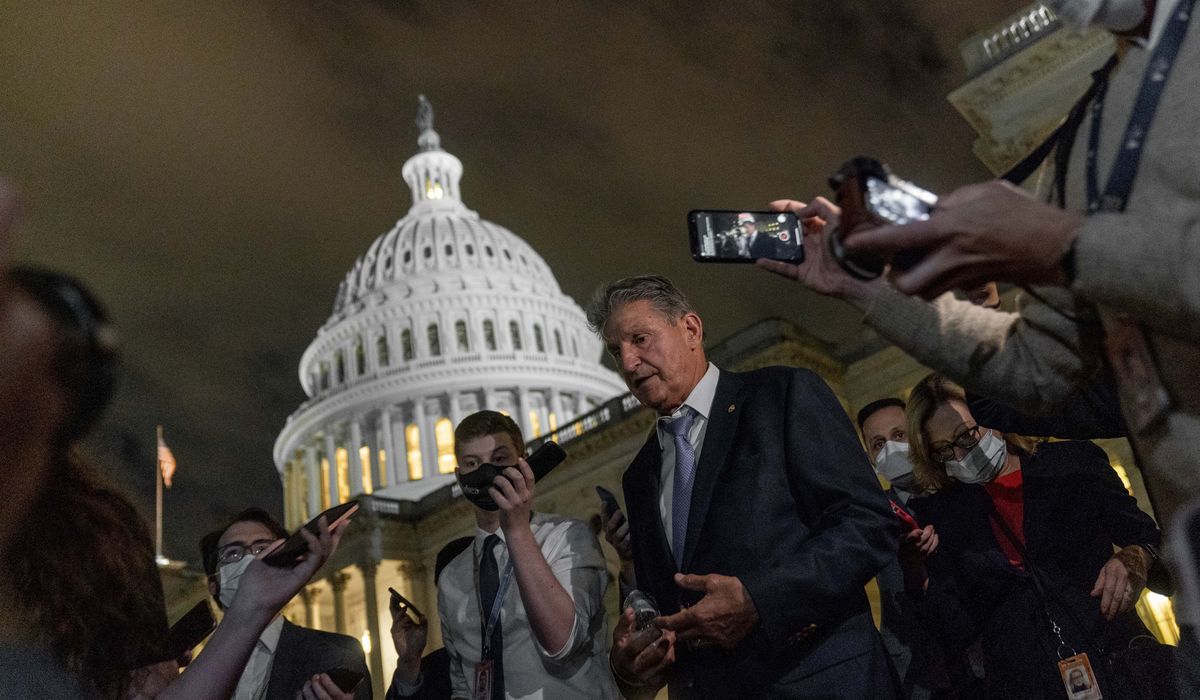
Democrats are being thwarted by strong party divisions over how to move forward on key parts of President Biden’s economic agenda as lawmakers face the harsh reality that they must cut the president’s $3.5 trillion social welfare bill to secure its passage.
Mr. Biden held a virtual meeting with liberal House Democrats on Monday afternoon to try to negotiate a lower price tag on his $3.5 trillion “reconciliation” package, White House press secretary Jen Psaki said.
Later this week, the president will have a virtual meeting with centrist House Democrats. Mr. Biden will travel to Michigan on Tuesday to pitch the centerpieces of his economic agenda.
Ms. Psaki said the discussions focus on “the path forward, which includes recognition that the package is going to be smaller than originally proposed.”
“What he wants to hear from them is what their priorities are, what their bottom lines are so he can play a constructive role in moving things forward,” she said.
In those talks, Mr. Biden is emphasizing the hurdle presented by moderate Democratic holdout Sens. Joe Manchin III of West Virginia and Kyrsten Sinema of Arizona, who oppose the higher price tag. Democrats can’t pass the measure in the Senate without them.
“Two people. They need 50 votes in the Senate. I have 48,” Mr. Biden said. “We’ll get it done.”
Democrats realized that they had to scale back the package after a months-long intraparty impasse pitting liberals and moderates against each other. The disarray put two of Mr. Biden’s top domestic priorities in jeopardy: the $3.5 trillion spending plan and the $1.2 trillion bipartisan infrastructure bill.
A planned House vote on the infrastructure bill fell apart Friday when liberals insisted that the larger bill be completed.
“Our new legislative goal must be to get both the infrastructure bill and the $3.5 trillion Build Back Better agenda done by the end of October,” said Senate Majority Leader Charles E. Schumer, New York Democrat.
To secure both bills, Democrats will have to find common ground. That appears increasingly unlikely when it comes to the $3.5 trillion package, which Democrats have dubbed “human infrastructure.”
The bill amounts to a wish list of liberal priorities such as proposals for climate change, tuition-free community college and expanded health care programs. Democratic leaders say the $3.5 trillion package complements the bipartisan infrastructure bill that focuses on roads, bridges, railways and airports.
Moderate Democrats, including Mr. Manchin and Ms. Sinema, have called for trimming and means-testing the bill.
“I have been consistent in my belief that any expansion of social programs must be targeted to those in need, not expanded beyond what is fiscally possible,” Mr. Manchin said.
Liberals say means-testing programs providing for free community college, expanded child care and more robust health care services — including expanded dental, vision and hearing coverage for Medicare — is a “red line.” They say the Democratic base is eager for “big, bold reform,” but most mechanisms used for means-testing are flawed.
“The U.S. measures poverty at three times the cost of [a minimum] food diet, assumes [a] worker has a stay-at-home spouse for child care and doesn’t factor cost of living,” said Rep. Alexandria Ocasio-Cortez, New York Democrat. “This means there are likely a lot more poor people in the U.S. than we admit.”
Instead of means-testing the proposed programs, Congress should shorten the effective date to cut costs, liberals say. The programs in the current bill wouldn’t take effect for a decade because of legislative rules.
Far-left Democrats say Congress should shorten the timeline to five years. Some say the shorter span could be politically advantageous because it would allow Democrats to campaign on making Mr. Biden’s expansion of the federal safety net permanent.
“What we have said from the beginning is, it’s never been about the price tag,” said Rep. Pramila Jayapal, a Washington state Democrat who heads the Congressional Progressive Caucus. “It’s about what we want to deliver. The price tag comes out of that.”
Moderate Democrats, such as Mr. Manchin and Ms. Sinema, say cost is the only factor.
“Proposing a historic expansion of social programs while ignoring the fact we are not in a recession and that millions of jobs remain open will only feed a dysfunction that could weaken our economic recovery,” Mr. Manchin said. “This is the shared reality we all now face, and it is this reality that must shape the future decisions that we, as elected leaders, must make.”
Mr. Manchin, a coal state lawmaker, is also pushing to temper liberal ambitions on climate change. As chairman of the Senate Energy Committee, Mr. Manchin has sought to protect the natural gas industry, which is responsible for electricity generation, from being unfairly targeted.
Democrats, especially in the House, have sought to phase out all fossil fuels, including natural gas, from the electrical grid by 2035. Mr. Manchin contends that such a policy would be disastrous for the U.S. economy.
“I’m all for clean energy, but I’m also for producing the amount of energy that we need to make sure that we have reliability,” he said.
Liberals say they are unlikely to back the overall package without a robust effort to tackle climate change.
“We have a once-in-a-generation chance to bring about real change for the American people,” said Rep. Adam B. Schiff, California Democrat. “Expanding Medicare, investing in families, workers, climate action, infrastructure. We need to do this.”
Moderates have the upper hand because Democrats can pass the social spending package only via a special process known as budget reconciliation. The process allows some spending and tax measures to avoid the Senate’s 60-vote filibuster threshold and pass with a simple majority of 51 votes.
Because the Senate is evenly split between the parties, every single Democrat needs to be on board for the reconciliation package to succeed.
Far-left Democrats say they have some leverage in the form of the $1.2 trillion traditional infrastructure package. The infrastructure bill, which passed the Senate in August, is awaiting action in the House.
The 98-member Congressional Progressive Caucus has threatened to withhold its support from the bipartisan bill unless moderates drop their opposition to the $3.5 trillion measure.








